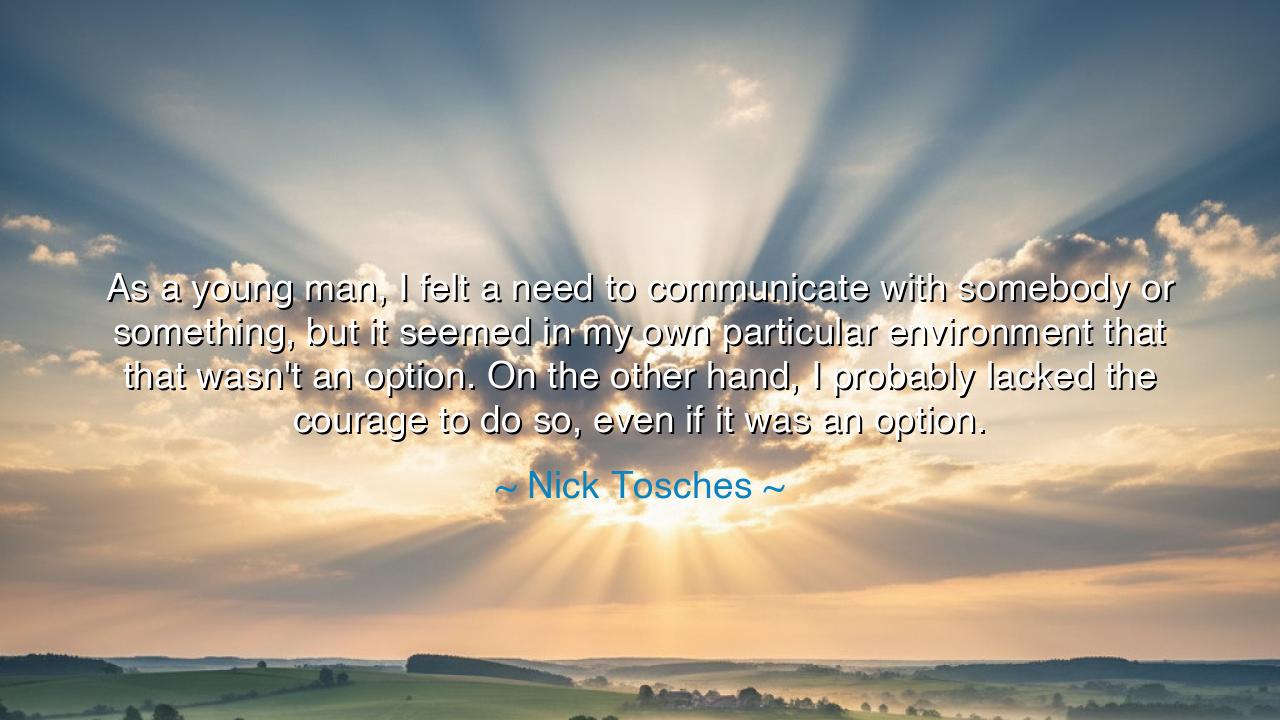
As a young man, I felt a need to communicate with somebody or
As a young man, I felt a need to communicate with somebody or something, but it seemed in my own particular environment that that wasn't an option. On the other hand, I probably lacked the courage to do so, even if it was an option.






“As a young man, I felt a need to communicate with somebody or something, but it seemed in my own particular environment that that wasn't an option. On the other hand, I probably lacked the courage to do so, even if it was an option.” — Nick Tosches
In these haunting and introspective words, Nick Tosches, the poet, journalist, and chronicler of the shadowed corners of human nature, speaks with the voice of one who has looked inward and found both longing and restraint. His words echo the universal ache of the human soul — the yearning to communicate, to connect with another being, to spill forth the silent truths that live within the heart. Yet they also confess a deeper tragedy: that sometimes the world around us — our environment — stifles that yearning, shaping us into silence. And even when the path is open, we find that courage itself can be a stranger to us. In this tension between the desire to speak and the fear to do so lies one of life’s most ancient struggles.
The origin of this quote can be traced to Tosches’ own youth, a time spent amid the rough streets and restless spirit of mid-twentieth-century America. Born to an Italian working-class family, he grew up in a world where men were taught to be hard, where emotion was weakness and tenderness a sin. To “communicate” one’s inner world — one’s doubts, one’s hunger for meaning — was not permitted by the codes of his surroundings. Like many of his generation, Tosches learned early the art of silence, of burying his soul beneath the surface of survival. Yet, as a writer, he later turned that buried longing into the very fuel of his art. His confession, therefore, is both personal and prophetic — the story of a man who found his voice only by confronting the silence that once imprisoned it.
The ancients, too, knew this burden of unspoken truth. The philosopher Seneca wrote that many live as “mute spectators of their own lives,” trapped by fear of judgment or rejection. And the poet Ovid, exiled from Rome, lamented that “the words I did not speak became my torment.” Both understood that the failure to communicate — to give voice to the soul — is not a small wound, but a spiritual suffocation. Tosches joins their lineage, a modern voice in the eternal chorus of those who have suffered in silence before learning that silence itself must be broken.
There is great courage in expression, though the world seldom sees it as such. To reveal one’s heart, to say, “This is who I am”, is to stand vulnerable before the gaze of others. Many prefer to remain hidden, shielded by irony or pride, fearing that honesty will expose their weakness. Yet it is only through that act of exposure that true connection is born. When Tosches admits that he “lacked the courage,” he speaks for countless souls who have felt the same — who have wanted to cry out, but could not; who have wanted to love, but feared rejection; who have wanted to create, but feared failure. Courage, therefore, is not the absence of fear, but the quiet victory over it — the moment when the soul decides that the pain of silence is greater than the risk of being heard.
Consider the story of Vincent van Gogh, whose life was a mirror to Tosches’ confession. A man aflame with longing, van Gogh sought endlessly to communicate — not only through words but through color, light, and texture. In his lifetime, he was dismissed, ridiculed, and left unseen. Yet he never abandoned the act of expression. His courage was not rewarded with wealth or comfort, but it immortalized his truth. Through his paintings, his voice still speaks — not to the critics of his time, but to the hearts of those who understand that art is the language of those who cannot speak otherwise.
From Tosches’ reflection, a lesson emerges that is as vital now as it was in the days of prophets and poets: do not let the fear of rejection silence the voice of your soul. Every human being carries a story, a song, a truth that demands to be spoken — not because it will be applauded, but because it will set the spirit free. To remain silent is to imprison oneself; to speak, even trembling, is to begin the journey toward liberation.
So let this wisdom be passed down: find the courage to communicate, even when your voice shakes. Speak your truth to those who will listen, or to the sky if no one will. Write, sing, pray, or paint — but express what stirs within you. The world is not made brighter by silence, but by the honest sounds of human hearts daring to be heard. As Nick Tosches learned, communication is not just connection — it is salvation. And though the world may not always understand, the act itself will awaken the light within you, turning isolation into understanding, and longing into peace.






AAdministratorAdministrator
Welcome, honored guests. Please leave a comment, we will respond soon